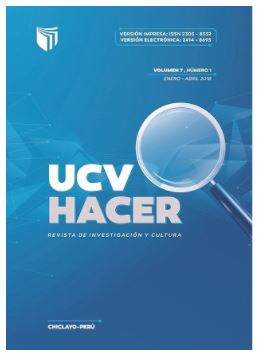Financial education, financial management in users of banking entities in the province of San Martín
DOI:
https://doi.org/10.18050/RevUCVHACER.v10n2a1Keywords:
Financial education, Financial management, Bank clients, Financial controlAbstract
The main objective of this research work was to determine the significant relationship between financial education and financial management of users of banking entities in the province of San Martín. The scope of the study was quantitative, non-experimental cross-sectional design of correlational scope, non-probabilistic sampling for convenience consisted of 290 users, whose ages ranged from 18 to 56 years (44.48% men and 55.52% women); to whom the financial education and financial management questionnaire was administered. The results found indicated that there is a significant correlation between financial education and financial management (r = .779; p < .001). Likewise, a highly significant positive relationship was found between financial education and financial management dimensions: income planning (rho = .606; p <.001), credit situation (rho = .484; p < .001), budgets (rho = .732; p < .001) and saving habits (rho = .506; p < .001). Similarly, a positive relationship was found between financial management and financial education dimensions: financial knowledge (rho = .623; p < .001), financial ability (rho = .638; p < .001), financial attitude (rho = .551; p < .001) and financial awareness (rho = .693; p < .001). It is concluded that the greater the financial education the users will have greater skills to manage their finances and vice versa.
References
Abad-Segura, E. y González-Zamar, M.D. (2021). Implications of Financial Education on Creative Entrepreneurship. Research Trends. 3C Empresa Investigación Y Pensamiento Crítico, 10 (1), 17–38. https://www.3ciencias.com/articulos/articulo/implicaciones-educacion-financiera-emprendimiento-creativo-tendencias-investigacion/
Aboagye, J. y Jung, Y. (2018). Debt holding, financial behavior, and financial satisfaction. Journal of Financial Counseling and Planning, 29(2), 208- 217 https://files.eric.ed.gov/fulltext/EJ1199119.pdf
Ameer, R. y Khan, R. (2020). Financial Socialization, Financial Literacy, and Financial Behavior of Adults in New Zealand. Journal of Financial Counseling and Planning, 31(2), 313–329. https://files.eric.ed.gov/fulltext/EJ1280281.pdf
Apaza, J. (2021). La gestión financiera y su influencia en la competitividad en comerciantes de la Asociación Centro Comercial Mercadillo Bolognesi de la ciudad de Tacna, 2019 [Tesis de Pregrado, Universidad de Tacna]. https://repositorio.upt.edu.pe/handle/20.500.12969/1699
Araujo, S., Lastra, N., Lucero, J. y Sandoval, D. (2019). El papel de la Educación Financiera y su incidencia en la economía familiar. Revista Dilemas Comtemporáneas: Educación, Política y Valores., 6, 1–18. https://dilemascontemporaneoseducacionpoliticayvalores.com/index.php/dilemas/article/view/1390/1680
Atkinson, A., McKay, S., Collard, S. y Kempson, E. (2007). Levels of financial capability in the UK. Public Money and Management., 27(1), 29–36. https://www.tandfonline.com/doi/epdf/10.1111/j.1467-9302.2007.00552.x?needAccess=true&role=button
Atkinson, A. y Messy, F. (2012). Measuring financial literacy: results of the OECD international Network of financial education (INFE) pilot study. OECD working papers on fianance, insurance and private pensions.No.15, OECD Publishing https://www.oecd-ilibrary.org/docserver/5k9csfs90fr4-en.pdf?expires=1676644313&id=id&accname=guest&checksum=6A3DF9F83FC90E44366BCB83F65181EC
Bapat, D. (2019). Exploring antecedents to financial management behavior for young adults. Journal of Financial Counseling and Planning, 30(1), 44-55. https://files.eric.ed.gov/fulltext/EJ1241103.pdf
Beshears, J., Choi, J., Laibson, D. y Madrian, B. (2018). Behavioral Household Finance. Handbook of Behavioral Economics: Foundations and Applications 1 (1). Elsevier B.V. https://www.hbs.edu/ris/Publication%20Files/behavioral_household_finance_a3b33098-e0c7-40e0-bf2f-fa4ceb6e6d06.pdf
Björklund, M. (2019). Teaching financial literacy: Competence, context and strategies among Swedish teachers. Journal of Social Science Education, 18(2), 28-48. https://www.jsse.org/index.php/jsse/article/view/1426/1512
Cabezas, E., Andrade, D. y Torres, J. (2018). Introducción a la metodología de la investigación científica. Repositorio Dspace. http://repositorio.espe.edu.ec/xmlui/handle/21000/15424
Céspedes, J. (2018). Análisis de la necesidad de la educación financiera en la formación colegial. Pensamiento Crítico, 22(2), 97–126. file:///D:/Data_Usuario/Nueva%20carpeta/Analisis_de_la_necesidad_de_la_educacion_financier%20(1).pdf
Cornejo-Saavedra, E., Umaña, B., Guíñez-Cabrera, N., Muñoz-Silva, D. y Mardones-Lagos, C. (2017). Endeudamiento y educación financiera del adulto joven en Chile. Revista Academia y Negocios, 3(2), 33–44. https://revistas.udec.cl/index.php/ran/article/view/2992/3077
Cueva. C. y Iturbe, I. (2021). ¿Puede la educación financiera reducir el comportamiento irracional en los mercados financieros?, 53–79. https://www.funcas.es/wp-content/uploads/2021/03/Cap-2-%C2%BFPuede-la-educaci%C3%B3n-financiera-reducir-el-comportamiento.pdf
Deacon, R. y Firebaugh, F. (1981). Family resource management: Principles and applications. MA: Allyn and Bacon. https://www.worldcat.org/es/title/family-resource-management-principles-and-applications/oclc/6143959
Durand, K., Robles, A., Rojas, J., Rojas, C. y Pucamayo, D. (2020). La importancia del manejo de las finanzas en actividades de la economía naranja del Perú. Universidad de Lima, Facultad de Ciencias Empresariales y Económicas, Carrera de Administración. https://repositorio.ulima.edu.pe/bitstream/handle/20.500.12724/12462/Durand_finanzas_personales_economia_naranja.pdf?sequence=1&isAllowed=y
Dwiastanti, A. (2015). Financial literacy as the foundation for individual financial behavior. Journal of Education and Practice., 6(33), 99-105. https://files.eric.ed.gov/fulltext/EJ1083664.pdf
Hada, T. y Schiau, L. (2011). Concepts regarding corporate finance. Financial administration and financial management. Anales de La Universidad Eftimie Murgu Resita, Fascículo II, Estudios Economicos, 65-70. https://eds.p.ebscohost.com/eds/pdfviewer/pdfviewer?vid=0&sid=fcabdeb7-4d80-4dce-ba9d-6c90ab543701%40redis
Hastings, J., Madrian, B. y Skimmyhorn, W. (2013). Financial literacy, financial education, and economic outcomes. Annual Review of Economics., 5, 347– 373. https://www.annualreviews.org/doi/abs/10.1146/annurev-economics-082312-125807
Hernández, S., Fernández, C. y Baptista, M. (2014). Metodología de la investigación. 6 Edición. https://www.uca.ac.cr/wp-content/uploads/2017/10/Investigacion.pdf
Hung, A., Parker, A. y Yoong, J. (2009). Defining and measuring financial literacy. Rand Corporation Working Papers, No. 708. https://www.rand.org/content/dam/rand/pubs/working_papers/2009/RAND_WR708.pdf
INEI. (2018). Perú: Indicadores de empleo e ingreso 2007-2017. https://www.inei.gob.pe/media/MenuRecursivo/publicaciones_digitales/Est/Lib1537/libro.pdf
INEI. (2019). Carpeta Georeferencial Región San Martín Perú. https://www.congreso.gob.pe/Docs/DGP/GestionInformacionEstadistica/files/i-22-san-mart%C3%8Dn.pdf
Lechuga, C., Sauza-Ávila, B., Pérez-Castañeda, S. y Cruz-Ramírez, D. (2021). Gestión y educación financiera: clave para el manejo eficiente de las finanzas personales y empresariales. Ingenio y Conciencia Boletín Científico de La Escuela Superior Ciudad Sahagún, 8(15), 1–7. https://repository.uaeh.edu.mx/revistas/index.php/sahagun/article/view/6138
Lusardi, A. y Mitchell, O. (2011). Financial literacy around the world: An overview. Journal of Pension Economics and Finance., 10(4), 497–508. https://www.cambridge.org/core/journals/journal-of-pension-economics-and-finance/article/abs/financial-literacy-around-the-world-an-overview/0488F901318E0FBC4C92DC6E964AB89C
Mejía, D., Pallota, A. y Egúsquiza, E. (2014). Encuesta de medición de capacidades financieras en los países Andinos. Informe para Perú. (CAF.) 2015. https://www.sbs.gob.pe/Portals/4/jer/cifras-encuesta/Informe1.pdf
Norvilitis, J. y MacLean, M. (2010). The role of parents in college students’ financial behaviors and attitudes. Journal of Economic Psychology, 31(1), 55–63. file:///D:/Data_Usuario/Nueva%20carpeta/NorvilitisMacLean2010JEP.pdf
Peña, D., Cambal. J., Arévalo. M. y Chavez, A. (2019). Modelo de gestión financiero para la empresa Kratos constructora cía. Ltda. de la ciudad de Puyo. Revista Dilemas Comtemporáneos: Educación, Política y Valores. 8(2). https://dilemascontemporaneoseducacionpoliticayvalores.com/index.php/dilemas/article/view/1363/1705
Rea, J., Serido, J., Borden, L., Danes, S., Ahn, S. y Shim, S. (2020). Who Says “I Do”? Financial Resources and Values on relationship choices of emerging adults. Journal of Financial Counseling and Planning., 31(1), 28–41. https://eric.ed.gov/?id=EJ1280028
Rivera, B. y Dominguez, B. (2018). La importancia de la educación financiera en la toma de decisiones de endeudamiento. Estudio de una sucursal de “Mi Banco” en México. Revista Perspectivas, (41), 117–144. http://www.scielo.org.bo/scielo.php?pid=S1994-37332018000100006&script=sci_abstract
Robb, C. y Woodyard, A. (2011). Financial knowledge and best practice behavior. Journal of Fnancial Counseling and Planning, 22(205), 60-70. https://files.eric.ed.gov/fulltext/EJ941903.pdf
Safronova, M., Safronova T. y Chernousova, N. (2020). Conceptual model of schoolchildren’s financial literacy and financial capability formation in the course of mathematics. Propósitos y Representaciones, 8(SPE2). https://revistas.usil.edu.pe/index.php/pyr/article/view/670/1027
Silva, L. y Vargas, L. (2020). La educación financiera para mejorar las finanzas personales de los docentes de la institución educativa N°00518 del distrito de Yantaló, 2019. (Tesis de Pregrado) Universidad César Vallejo. https://repositorio.ucv.edu.pe/bitstream/handle/20.500.12692/43719/Silva_DLA-Vargas_VLO-SD.pdf?sequence=1&isAllowed=y
Tang, N., Baker, A. y Peter, P. (2015). Investigating the disconnect between financial knowledge and behavior: The role of parental influence and psychological characteristics in responsible financial behaviors among young adults. Journal of Consumer, 49 (2), 376–406. https://onlinelibrary.wiley.com/doi/abs/10.1111/joca.12069
Terrazas, R. (2009). Modelo de gestión financiera para una organización perspectivas. Revista Perspectivas, (23), 55-72. https://www.redalyc.org/pdf/4259/425942159005.pdf
Villada, F., López, J. y Muñoz, N. (2017). El papel de la educación financiera en la formación de profesionales de la ingeniería. Formación Universitaria, 10(2), 13–22. https://www.scielo.cl/pdf/formuniv/v10n2/art03.pdf
Wagner, J. (2019). Financial education and financial literacy by income and education groups. Journal of Financial Counseling and Planning, 30(1), 132-141. https://files.eric.ed.gov/fulltext/EJ1241094.pdf
Zhao, H. y Zhang, L. (2020). Talking money at home: the value of family financial socialization. International Journal of Bank Marketing, 38(7), 1617– 1634. file:///D:/Data_Usuario/Nueva%20carpeta/Researchgateversion.pdf
Downloads
Published
How to Cite
Issue
Section
License

This work is licensed under a Creative Commons Attribution-NonCommercial-ShareAlike 4.0 International License.










